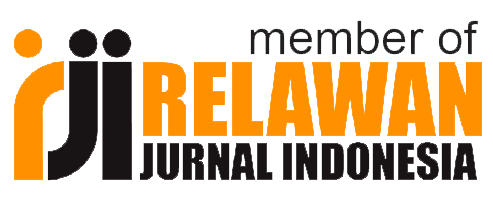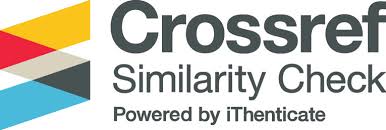The Relationship Between Knowledge and The Use of Health Supplements During The Pandemic Towards Non-Medical Students of Sanata Dharma University
Abstract
The World Health Organization (WHO) declared COVID-19 as a pandemic on 11 March 2020. Based on the data on the distribution of the development of Covid-19, the pandemic in Indonesia itself is still high. One of the efforts to prevent the spread of COVID-19 cases is by increasing the body's immune system. Consuming health supplements is one of the efforts to increase endurance because it has the function to maintain, improving and/or repairing health. This study aims to determine whether there is a relationship between knowledge and actions to use health supplements among non-health students at Sanata Dharma University.
This study is a type of Analytical Observational research with a cross-sectional approach. The research instrument is a questionnaire that was distributed online through the Google Form platform. The sample in this study was 368 respondents. The Data analysis in this study uses descriptive statistical tests, normality tests, chi-square tests and simple linear regression tests.
In respondents' knowledge of health supplements, 85.9% of 316 respondents fell into the "GOOD" category, and 14.1% of 52 respondents fell into the "BAD" category. While the respondents that use health supplements is 42.4% of 156 respondents, 34.5% of 127 respondents fall into the category of "GOOD", and 23.1% of 85 respondents fall into the category of "GOOD" and there are no respondents who fall into the category of "BAD" and "VERY BAD". This study concludes that there is a relationship between knowledge and actions to use health supplements during a pandemic among non-health students at Sanata Dharma University Yogyakarta, with a strength level, namely "STRONG" with a correlation coefficient value of 0.610
References
[2] International Labour Organization (ILO), Kemnaker, Indonesia IDKK. Pedoman Pencegahan dan Penanggulangan Covid-19 di Tempat Kerja. Unais. 2020. 1–83 p.
[3] Badan POM. Pedoman Penggunaan Herbal dan Suplemen Kesehatan dalam Menghadapi COVID-19 di Indonesia. Vol. 1, Badan Pengawas Obat dan Makanan Republik Indonesia. 2020. 1–133 p.
[4] RI B. PERATURAN BADAN PENGAWAS OBAT DAN MAKANAN. 2019.
[5] Depkes RI. Peraturan Pemerintah Republik Indonesia Nomor 51 tahun 2009 tentang Pekerjaan Kefarmasian. Dep Kesehat RI. 2009;(57):3.
[6] KEMENTRIAN PERINDUSTRIAN RI. PERATURAN MENTERI PERINDUSTRIAN REPUBLIK INDONESIA NOMOR 2 TAHUN 2019 TENTANG TATA CARA PENYAMPAIAN DATA INDUSTRI, DATA KAWASAN INDUSTRI, DATA LAIN, INFORMASI INDUSTRI, DAN INFORMASI LAIN MELALUI SISTEM INFORMASI INDUSTRI NASIONAL [Internet]. KEMENTRIAN PERINDUSTRIAN REPUBLIK INDONESIA. [cited 2023 Apr 27]. p. 2019. Available from: https://www.regulasip.id/book/16270/read
[7] Harahap NA, Khairunnisa K, Tanuwijaya J. Patient knowledge and rationality of self-medication in three pharmacies of Panyabungan City, Indonesia. J Sains Farm Klin. 2017;3(2):186.
[8] Irawati R, Rumi A, Firdawati D, Parumpu A. Gambaran Tingkat Pengetahuan Swamedikasi Obat Analgesik pada Mahasiswa-Mahasiswi Universitas Tadulako di Kota Palu. J Heal Sains [Internet]. 2021 Mar 25 [cited 2023 Apr 27];2(3):350–61. Available from: https://jurnal.healthsains.co.id/index.php/jhs/article/view/107/193
[9] Notoatmodjo S. Health Research Methodology [Internet]. Rineka Cipta Publisher, Jakarta. 2012 [cited 2023 Apr 27]. Available from: https://www.scirp.org/(S(351jmbntvnsjt1aadkozje))/reference/referencespapers.aspx?referenceid=2744598
[10] Budiman, Riyanto A. Kapita Selekta Kuesioner Pengetahuan dan Sikap Dalam Penelitian Kesehatan. Vol. 5, Salemba Medika. 2013.
[11] Masturoh I, T Anggita N. Pusat Pendidikan Sumber Daya Manusia Kesehatan Badan Pengembangan dan Pemberdayaan Sumber Daya Manusia Kesehatan Kementrian Kesehatan Republik Indonesia. Metodol Penelit Kesehat Bahan Ajar Rekam Medis dan Inf Kesehat. 2018;
[12] Zulbayu LOMA, Nasir NH, Awaliyah NH, Juliansyah R. Edukasi DAGUSIBU (Dapatkan, Gunakan, Simpan dan Buang) Obat di Desa Puasana, Kecamatan Moramo Utara, Kabupaten Konawe Selatan. J Mandala Pengabdi Masy. 2021;2(2):46–51.
[13] Kemenkes RI. Pedoman Pelaksanaan Program Gerakan Masyarakat Cerdas Menggunakan Obat (GeMa CerMat). Kemenkes RI. 2020.
[14] WHO. Disposal of Unused Medicines: What You Should Know. [Internet]. 2020 [cited 2023 Apr 27]. Available from: https://www.fda.gov/drugs/safe-disposal-medicines/disposal-unused-medicines-what-you-should-know
[15] I Nengah B., Ahmad FA, Chrysella R, Devi AS, Farah K, Fitria HNES, et al. Hubungan Usia Dengan Pengetahuan Dan Perilaku Penggunaan Suplemen Pada Mahasiswa Institut Teknologi Sepuluh Nopember. J Farm Komunitas. 2020;7(1):2.
(16) Sholiha S. Tingkat Pengetahuan Pasien dan Rasionalitas Swamedikasi di Apotek Kecamatan Colomadu. Pharmaceutical Journal of IslamicPharmacy. 2019; 3(2): 11
(17) Kristina SA. A Survey on Medicine Disposal Practice among Households in Yogyakarta. Asian Journal of Pharmaceutics. Universitas Gajah Mada Yogyakarta. 2018.
(18) Wiryanti LSU, Karminingtyas SR. Hubungan Tingkat Pengetahuan dan Parktik DAGUSIBU Obat pada Pengunjung Apotek Indobat Pakerisan. Indonesia Journal of Pharmacy and Natural Product. 2022;5(1);7
(19)Farah Kais Alhomoud, Mohammed Basil, Andrey Bondaev. Knowledge, Attitudes and Practices(KAP) Relating to Dietary Supplements Among Health Sciences and Non-Health Sciences Students in One of The Universities of United Arab Emirates (UAE). Journal of Clinical & Diagnistic Research. 2016;10(9).
(20) Annette Dickinson, Leslie Bonci, Nicolas Boyon, Julio C Franco. Dietitians use and recommend dietary supplements: report of a survey. Nutrition Journal. 2012; 11(14).













